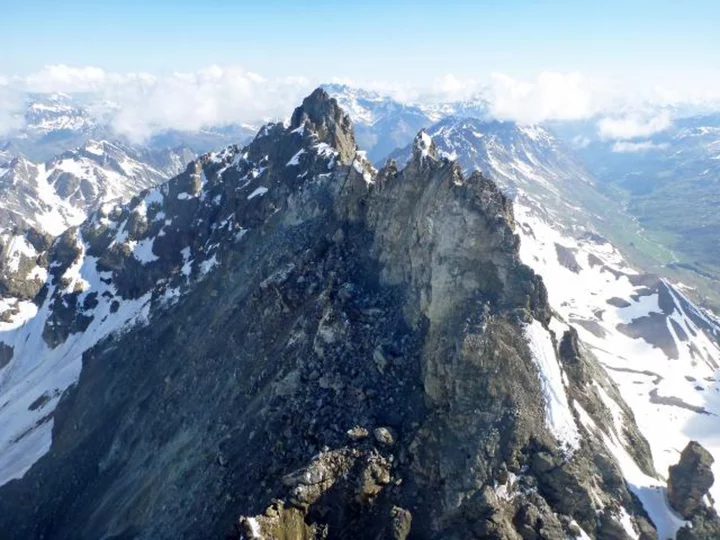Part of the summit of a mountain in the Austrian state of Tyrol has collapsed, sending more than 100,000 cubic meters of rock crashing into the valley below and triggering mudslides.
Rocks started falling Sunday from Fluchthorn, a nearly 3,400 meter (11,155 foot) mountain in the Silvretta Alps on the border between Switzerland and Austria, in an incident state geologists have said was caused by thawing permafrost.
No one was injured by the rockfall, according to Alpine police.
In a reconnaissance flight over the affected area, state geologists made initial assessments of the amount of fallen rock, but they say these may well be conservative as it will take time to get a more accurate picture.
"This is a relatively large incident, we're talking about at least 100,000 cubic meters (around 3.5 million cubic foot) of rock that has fallen off, likely more than that," said Thomas Figl, a state geologist, in a video produced by the Tyrolean state government.
The geologists have pinned the collapse on the thawing of permafrost, a long-term frozen layer of soil and rocks. Most often associated with Arctic regions, permafrost is also found high in the European Alps.
"We can be relatively sure about the cause of this incident: permafrost. The ice is the glue of the mountains and that ice has been thawing over a long period of time due to climate change. That then causes the results that we see here," Figl said.
When permafrost thaws it can have a destabilizing effect, said Marcia Phillips, permafrost research group leader at the WSL Institute for Snow and Avalanche Research in Switzerland.
"Water can penetrate deep into rock masses through newly opened clefts, which were previously plugged with permafrost ice," she told CNN, explaining that this can lead rocks to fracture.
There isn't enough data to say whether rockfalls have increased in recent years, as it is usually only large events that are well-documented, said Phillips. Scientists rely on information from the public, she added, and many rockfalls happen in remote areas.
But, as human-caused climate change pushes up global temperatures, leading to thawing permafrost and melting snow and glaciers, rockfalls in this region look set to become more common.
"Along with rising permafrost temperatures, loss of ice and higher ground water contents we expect an increase in slope movements and rockfalls at elevations where permafrost is found in the Alps," Phillips said.
Rockfalls can cause huge disruption to those living in the shadows of these mountains.
In May, the residents of the Swiss village of Brienz, in the region of Graubünden near Davos, were forced to evacuate after warnings that their homes could be crushed by nearly 2 million cubic meters of rocks falling from the mountain above it.
The rocks haven't yet hit the village, but residents are unable to return. The past few days have seen a dramatic increase in activity, with a lot of rocks falling, Christian Gartmann, a member of the crisis management board for the region that includes Brienz, told CNN. "It's very dangerous there, we have a lot of rocks coming down," he said.









